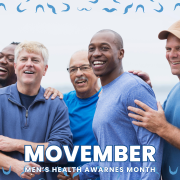
Every November, Movember invites men to grow mustaches—not for style, but for survival. It’s a visible reminder that men’s health matters, especially their mental and emotional well-being. Beneath the humor lies a sobering reality: too many men are fighting silent battles, smiling through exhaustion, loneliness, and pain that runs far deeper than words can reach.
Research continues to confirm what counselors see daily: men are far less likely to seek mental health support, yet they are far more likely to die by suicide (World Health Organization, 2021). Cultural norms that define masculinity as stoic, unemotional, and self-sufficient often prevent men from reaching out before it’s too late (Mahalik, Burns, & Syzdek, 2007; Seidler, Dawes, Rice, Oliffe, & Dhillon, 2016). That “be tough” script may look strong on the surface, but over time it becomes a cage—trapping emotions men were never meant to carry alone.
As a Christian counselor and pastor, I’ve learned that the enemy’s greatest tactic isn’t always destruction—it’s disconnection. When a man loses his voice, he begins to lose himself. Scripture reminds us, “As iron sharpens iron, so one man sharpens another” (Proverbs 27:17). Healing begins when men stop isolating and start connecting—with God, with others, and with their own emotions. In my practice, I work from an integrative model rooted in Adlerian, Gestalt, CBT, and Person-Centered approaches to name a few (Corey, 2024; Sperry & Sperry, 2020), blended with biblical integration (Tan, 2011; McMinn, 2017). This framework—what I call a Psychopnuemasomatic lens—addresses the whole person: mind, body, and spirit. Healing isn’t just emotional adjustment; it’s spiritual transformation. A man doesn’t just learn to manage stress; he learns to rediscover purpose, reclaim identity, and realign with God’s design for his life.
Movember isn’t just about growing mustaches—it’s about growing awareness, courage, and brotherhood. If you’re struggling with anxiety, depression, shame, or anger, you don’t have to carry it alone. True strength isn’t silence—it’s the courage to speak, to seek help, and to start healing.
If you’re ready to talk, I’m here to listen. You can reach me directly at 941-667-7455, by email at tmluster@seu.edu, or through my counseling page: fortmyerstherapist.com.
Your story matters. Your healing matters. And it’s never too late to reclaim the man God designed you to be.
References
– Corey, G. (2024). Theory and practice of counseling and psychotherapy (11th ed.). Cengage Learning.
– Mahalik, J. R., Burns, S. M., & Syzdek, M. (2007). Masculinity and perceived normative health behaviors as predictors of men’s health behaviors. Social Science & Medicine, 64(11), 2201–2209.
– McMinn, M. R. (2017). Psychology, theology, and spirituality in Christian counseling (2nd ed.). Tyndale House.
– Seidler, Z. E., Dawes, A. J., Rice, S. M., Oliffe, J. L., & Dhillon, H. M. (2016). The role of masculinity in men’s help-seeking for depression: A systematic review. Clinical Psychology Review, 49, 106–118.
– Sperry, L., & Sperry, J. (2020). Case conceptualization: Mastering this competency with ease and confidence (3rd ed.). Routledge.
– Tan, S.-Y. (2011). Counseling and psychotherapy: A Christian perspective. Baker Academic.
– World Health Organization. (2021). Suicide worldwide in 2019: Global health estimates. World Health Organization.
– Corey, G. (2024). Theory and practice of counseling and psychotherapy (11th ed.). Cengage Learning.
– Mahalik, J. R., Burns, S. M., & Syzdek, M. (2007). Masculinity and perceived normative health behaviors as predictors of men’s health behaviors. Social Science & Medicine, 64(11), 2201–2209.
– McMinn, M. R. (2017). Psychology, theology, and spirituality in Christian counseling (2nd ed.). Tyndale House.
– Seidler, Z. E., Dawes, A. J., Rice, S. M., Oliffe, J. L., & Dhillon, H. M. (2016). The role of masculinity in men’s help-seeking for depression: A systematic review. Clinical Psychology Review, 49, 106–118.
– Sperry, L., & Sperry, J. (2020). Case conceptualization: Mastering this competency with ease and confidence (3rd ed.). Routledge.
– Tan, S.-Y. (2011). Counseling and psychotherapy: A Christian perspective. Baker Academic.
– World Health Organization. (2021). Suicide worldwide in 2019: Global health estimates. World Health Organization.


